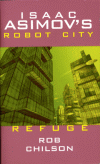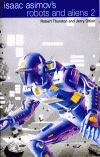I’m going to try something new and post a deal on a book that I plan on reading. There’s a Kindle edition sale on The Robot Chronicles for just 99 cents! This is a compilation of recent stories from a wide range of authors. I’m a huge fan of robot stories so this is sure to be a dollar well spent. Reviewing Asimov’s complete Robot & Foundation Universe was one of the main reasons I created this site. One of the newer authors I’ve been reading is Hugh Howey, featured in this compilation. I’ve thoroughly enjoyed his Wool/Shift/Dust series (sadly not reviewed yet) and look forward to his approach on this subject. This will also be a good opportunity to explore some other authors.
The print price is $15.99, with the Kindle edition going to $5.99 just over 5 days from the time of this posting. Buy now, for less than the cost of a soda!


